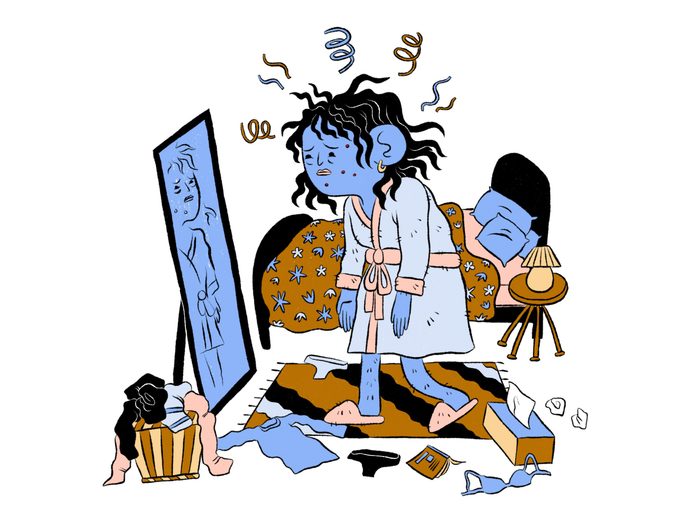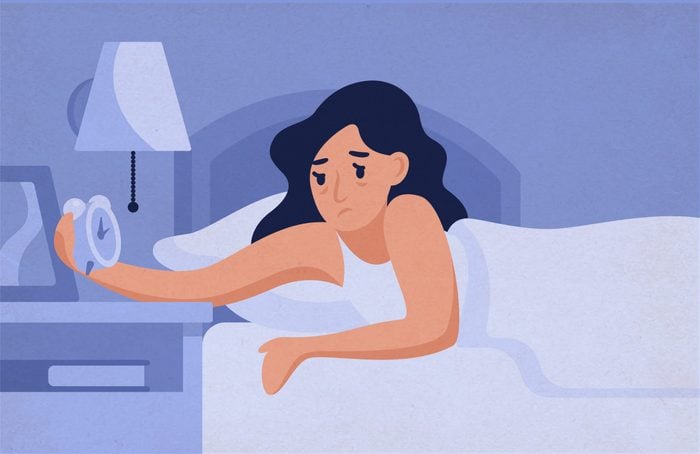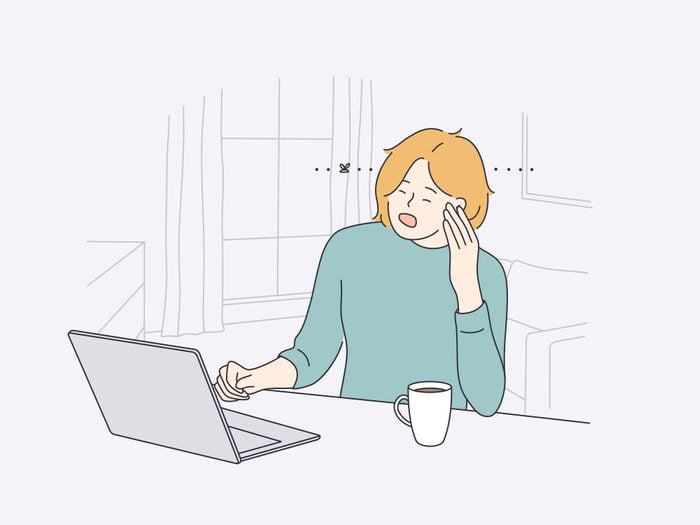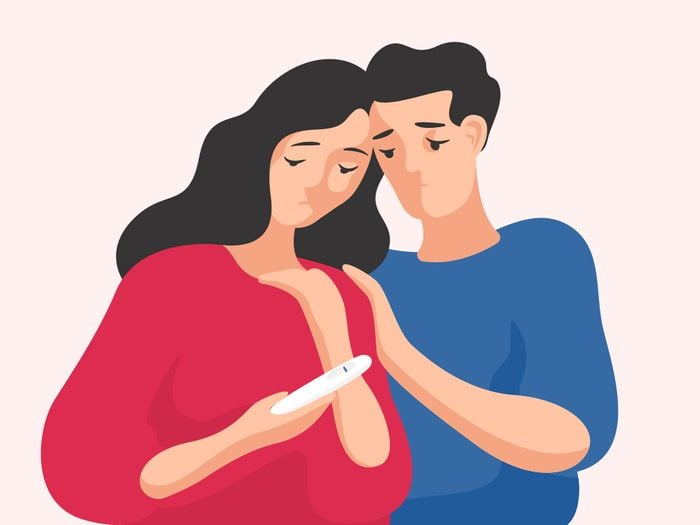
This is ourselves — under pressure:
Throughout the pandemic, one voice has reverberated through the corridors of my mind. My mother, a nurse for 30-plus years—who retired at the end of 2019 and then went right back to work at a COVID-19 testing centre in March 2020—has always said “stress will make you sick.” She told me that when I was an anxious child chasing perfection, when I was a new mom chasing perfection and now, during the pandemic (I’ve dropped the perfectionism but still hang on to the stress).
Throughout my life, stress has almost always found a path from the internal to the external: teeth grinding, appetite loss, dizzy spells. Living under the stress of the pandemic for more than a year has been no different for me—or for nearly everyone I’ve spoken with. Here are a few of the ways stress can present itself physically and what to expect when this particular stress begins to subside.
(Related: Why Exercise Can Be the Most Effective Way to Relieve Stress)

Pandemic stress is causing sleep issues.
I did some informal research on Twitter by asking Canadian women what pandemic stress has done to their bodies. An overwhelming number of people chimed in about the toll it’s taken on their sleep. For many, insomnia became a constant companion. Others started finding they had a very difficult time waking up. Another common response was that their dreams (or nightmares) were extremely vivid and upsetting. Pandemic sleep disruption has become so common that neurologists have actually coined a term for it: COVID-somnia.
“Almost all my clients have reported sleeping problems or sleep disturbances,” says Roxanne Francis, a psychotherapist and corporate consultant based in Ajax, Ont. “When we are faced with a stressful situation, our bodies release the hormones adrenalin and cortisol.” Adrenalin prepares our bodies for a fight-or-flight response, while cortisol helps out by reducing the bodily functions that aren’t a priority during that response. As Francis explains, when stress occurs over a prolonged period, the fight-or-flight system is always activated and these hormones are continuously released. “It therefore becomes difficult to fall asleep, thanks to increased blood pressure and heart rate, increased energy and sugars in the body and poor digestion.”
Good sleep hygiene—how we prepare for sleep and create an optimal sleep environment—is critical for healthy sleep at all times, but especially during times of stress. Journalling, doing light exercise and limiting screen time at least one hour before bed sound like simple steps, but they can make a big difference—and they’re great habits to continue even after stress diminishes. Managing stress will aid in turning off that constant fight-or-flight response, reset your hormone levels and lead to even better sleep.
(Related: 4 Sleep Hacks to Make Sure You Get Your Vitamin Zzz)

It’s making us grind our teeth.
I started grinding my teeth in my sleep as a teen—my family could hear me doing it from outside my bedroom, and I woke every morning with incessant jaw pain and headaches. My dentist eventually fitted me with a (very sexy) mouthguard, but I admittedly have not kept up with wearing it. Throughout the pandemic, my teeth grinding has returned with more regularity, and I often don’t realize I’m clenching my jaw until I read one of those tweets reminding you to unclench, lower your shoulders and drink some water.
A March 2021 survey from the American Dental Association found that 70 percent of dentists saw an increase in patients dealing with teeth grinding and jaw clenching during the pandemic. For relief, the Canadian Dental Association recommends applying a cold or warm compress to your jaw, massaging and stretching your jaw and relaxing your mouth (lips barely touching, teeth apart, tongue resting on the roof of your mouth). If none of that works, you might be in the running for a (very sexy) mouthguard, like me.
(Related: 35 Secrets Your Dentist Won’t Tell You)

It’s causing reproductive issues.
When I put out my investigative tweet about women and their stress responses, I was struck by how many saw weight gain in their lower abdomen during the pandemic—and then were diagnosed with fibroids. Uterine fibroids can be relatively unnoticeable or can grow to the point where they cause heavy menstrual bleeding, abdominal pain and fertility issues. While stress is a known contributor to increased uterine fibroid pain, studies have also shown a correlation between chronic psychological stress and fibroid onset, particularly for Black women.
Stress has done a number on people’s periods too. Science shows that cortisol (the hormone our bodies create under stress) can affect the hypothalamus, the part of your brain that controls your menstrual cycle. Cortisol flooding the hypothalamus can lead to lighter or late periods—or no periods at all, called amenorrhea. Dr. Olivia Rose, a naturopathic doctor in Toronto, adds that chronic psychological stress and elevated cortisol can disrupt the communication pathway between the brain and the adrenal glands, where stress hormones are produced. “That leads to fluctuations in progesterone and estrogen levels, which could possibly affect the growth of uterine fibroids,” she says. “Research has also shown that an increase in [the stress hormone] norepinephrine can lead to the development of ovarian cysts and missed periods.”
If you’re absolutely sure you aren’t pregnant, a thyroid function, ovary function or prolactin test can pinpoint the exact cause and plan of treatment to get your cycle back on track. General stress management can help realign your hormones, Rose says. “I encourage my patients to eat a balanced diet, which may include cutting back on caffeine and alcohol intakes, especially when stressed. Exercise and meditation are also helpful.” Once your stress levels have lowered, stress-related amenorrhea can resolve itself, letting your periods return.

It’s the reason for greying hair.
Part of folks’ pandemic stress has been around their limited access to skilled hairstylists, leaving some of us to DIY it while others let their hair rock as is. Many could relate when CTV National News anchor Lisa LaFlamme chose to let her grey roots grow in. Greys appear when your hair follicles stop producing pigment, and one of the most common predictors of your greying pattern is actually genetics. While a 2020 study did show that acute stress in mice leads to accelerated greying of the fur, for humans, the verdict is still out.
One thing stress can do is cause a condition called telogen effluvium, which causes hair to shed at around three times the normal rate. This explains why just as many women told me about their hair loss as they did about their greys. The good news with stress-related telogen effluvium is that it does not cause permanent balding, so your hair should stop shedding after about six months. And the good news with greying is that you can always choose to embrace it or dye it—whatever brings you the least stress.
Next, this is what you need to know about good stress versus bad stress.
